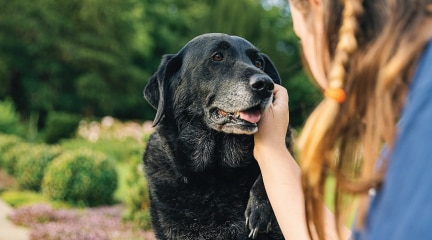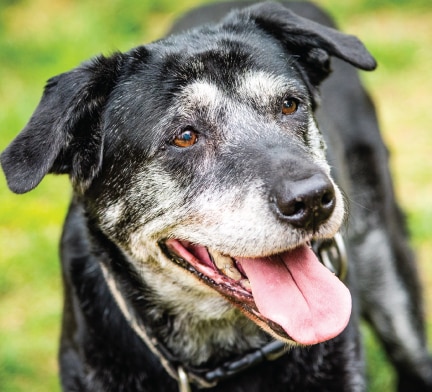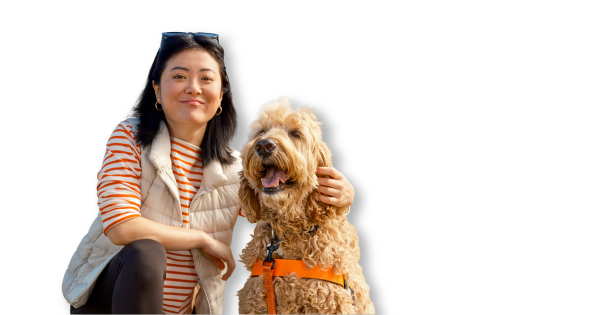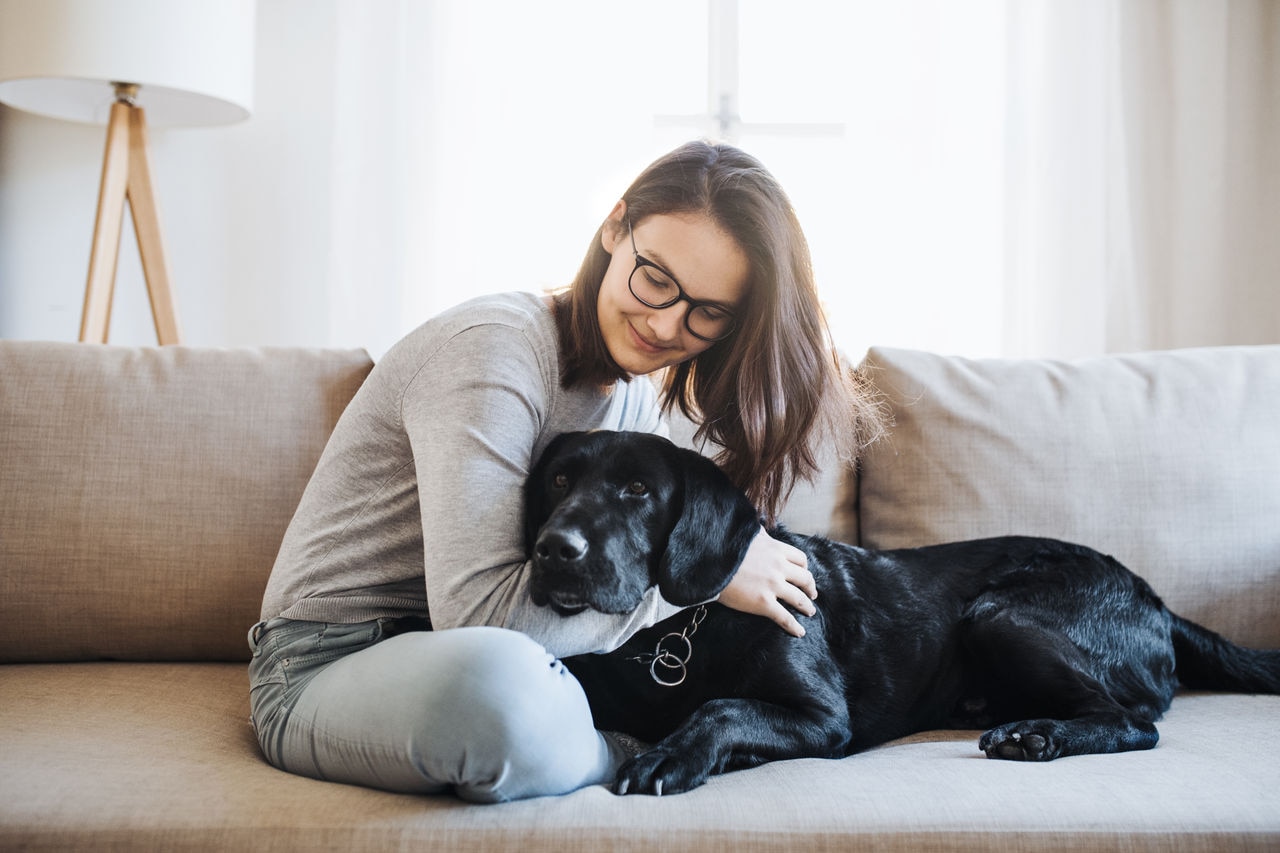- text
-
° This offer is only available for policyholders who have a registered Everyday Rewards Card linked to their eligible active Everyday Insurance policy. This offer is limited to one in-store Woolworths Supermarket transaction up to $500, with a maximum saving of $50 per Everyday Rewards Card, per month, regardless of the number of Woolworths services you use. For full T&Cs click here.
Canine Cognitive Dysfunction in senior dogs.
Understanding and caring for senior dogs.
Pet Insurance | 4 minute read | 9 July 2025

- Understanding and caring for senior dogs.
- What is Canine Cognitive Dysfunction (CCD)?
- Recognising the symptoms of CCD.
- Prevalence of CCD.
- CCD risk factors.
- Causes of CCD.
- Treatments for CCD.
- Living with a dog affected by CCD.
- 6 methods to help your senior dog with CCD.
- Emotional support for pet owners.
- How Everyday Pet Insurance can help.
Ageing is a natural process that affects all living beings, and dogs are no exception. Some may develop Canine Cognitive Dysfunction (CCD) as they age. Like dementia or Alzheimer's disease in humans, CCD can significantly impact a dog's behaviour, memory, and quality of life. This article will explore what CCD is, what causes it and practical ways to care for a dog living with this condition.
What is Canine Cognitive Dysfunction (CCD)?
Canine Cognitive Dysfunction (CCD) is a neurodegenerative disorder primarily seen in senior dogs. It affects cognitive functions, such as memory, learning and awareness, and generally occurs after the age of nine. Research1 indicates that as many as 28% of dogs aged 11-12 and nearly 68% of dogs aged 15-16 exhibit signs of CCD.
While CCD is not a normal part of ageing, its symptoms often overlap with other age-related issues, making diagnosis challenging without veterinary assessment.
Recognising the symptoms of CCD.
The signs of CCD are often summarised using the acronym DISHAL.
D - Disorientation: Dogs may seem lost in familiar settings, stare at walls, or get stuck in corners.
I - Interaction changes: Affected dogs might withdraw from family members or show anxiety around others.
S - Sleep-wake cycles change: They may become restless at night, bark, or vocalise, while sleeping more during the day.
H - House-training issues: Dogs might forget house-training rules or urinate indoors despite being let out.
A - Activity level changes: Some dogs develop repetitive behaviours, such as pacing, circling, or excessive licking.
L - Learning/memory changes: Some dogs may appear to have forgotten tricks or routines they once learned and/or be unable to stay on task.

If you notice these symptoms, consult your veterinarian. They can rule out other health issues, such as arthritis, vision loss, or urinary tract infections, that may mimic CCD symptoms.
Prevalence of CCD.
Age-related increase: A study in 2020 involving 15,019 dogs found the odds of a CCD diagnosis increased by 52% with each additional year of age.*
Age-specific rates: Research from 2017-2020 indicates varying prevalence rates based on age groups:^
8 to <11 years: 8.1%
11 to <13 years: 18.8%
13 to <15 years: 45.3%
15 to <17 years: 67.3%
17 years: 80%

CCD risk factors.
Activity level: Dogs with low activity levels have 6.47x higher likelihood of developing CCD compared to highly active dogs.
Medical history: Dogs with histories of neurological, eye or ear disorders are at increased risk for CCD.
Body condition: A thin body condition score has been associated with a higher chance of cognitive decline in dogs.
Causes of CCD.
CCD results from various age-related changes in the brain, including:
1. Amyloid plaques.
A buildup of beta-amyloid proteins in the brain interferes with everyday cell communication and function.
2. Oxidative stress.
Damage caused by free radicals, leading to inflammation and cell death.
3. Reduced blood flow.
Decreased circulation in the brain, which limits oxygen and nutrient supply.
4. Neurotransmitter imbalance.
Changes in chemicals, such as dopamine and serotonin, which affect mood, behaviour, and cognition.
While these changes are inevitable to some degree, not all senior dogs develop CCD, suggesting a combination of genetic, environmental, and lifestyle factors play a role.
Treatments for CCD.
While there is no cure for CCD, several treatment options can help manage the condition and improve your dog's quality of life.

Dietary changes: Your dog may be placed on a specific therapeutic diet to support brain health. These diets often contain ingredients rich in antioxidants, fats, and fatty acids to protect and promote healthy brain cells.
Dietary supplements: Your veterinarian may recommend supplements that are rich in antioxidants or oils containing medium-chain triglycerides (MCTs). MCTs provide an alternative energy source for the brain. This is because dogs with CCD often become less efficient at using glucose in their brain.
Medications: Certain drugs may help improve cognitive function. For example, Monoamine Oxidase (MAO) inhibitors, such as Anipryl, can enhance neuron communication and protect the brain from further damage. In some countries, drugs, such as propentofylline, are used to increase blood flow to the brain, potentially benefiting dogs with CCD.
Living with a dog affected by CCD.
Caring for a dog with CCD requires patience, compassion and practical adjustments to make their life as comfortable as possible. There are several ways to help them feel more at ease.
Calmness: Minimise loud noises, visitors, and sudden changes.
Comfort: Use pheromone diffusers around the house, such as Adaptil.
Nutrition: Feed brain-boosting diets with omega-3s and MCTs.
Routine: Keep feeding, walks, and bedtime consistent.
Safety: Provide a quiet, familiar area with soft bedding.
Stimulation: Use interactive toys, training games, and new challenges.
Patience: Respond with kindness and positive reinforcement.
Mobility: Regular short walks help physical and mental health
Navigation: Keep furniture in place, use non-slip mats, and add nightlights.
6 methods to help your senior dog with CCD.
1. Maintain a routine.
Dogs thrive on routine and consistency becomes even more critical for CCD patients. Stick to regular schedules for feeding, walks and bedtime. Avoid sudden changes to your dog's environment as this can increase confusion and anxiety.
2. Create a safe, familiar space.
Designate a quiet, comfortable area where your dog can retreat if feels overwhelmed. Use soft bedding, familiar toys and comforting scents to help it relax. Keep the space free of obstacles to prevent disorientation.
3. Support cognitive function.
Interactive toys: Engage your dog's mind with food-dispensing puzzles, snuffle mats or scent-tracking games.
Training games: Simple commands like "sit" or "stay" can help reinforce memory and focus.
Mental stimulation: Rotate toys regularly and introduce gentle challenges to keep their brain active.


4. Adapt the home environment.
Consistent furniture placement: Avoid rearranging furniture to help your dog navigate more easily.
Non-slip mats: Place rugs or mats on slippery floors to prevent falls.
Nightlights: Use dim lighting at night to help dogs who are restless or confused in the dark.
5. Improve physical health.
Daily walks: Short, regular walks can maintain mobility and provide mental stimulation.
Healthy diet: Consider special diets for senior dogs or those containing antioxidants, omega-3 fatty acids, or medium-chain triglycerides (MCTs) to support brain health.
6. Manage behavioural changes.
Remain patient: Accidents and unusual behaviours are common. Use positive reinforcement rather than punishment.
Minimise stressors: Minimise loud noises, unfamiliar visitors, or sudden changes.
Pheromone diffusers: Products such as Adaptil can help create a calming environment for your dog.
Emotional support for pet owners.
Living with a dog with CCD can be emotionally challenging, as you may witness changes in their personality and abilities. Seek support from friends, family, or online communities of pet owners who understand what you're going through. Remember, your efforts significantly impact your dog's comfort and happiness.
How Everyday Pet Insurance can help.
Unexpected vet bills can be stressful. Pet Insurance can help cover the costs of diagnosis, treatment, and medication for various health conditions, including those specific to your dog.
Here are some benefits you can enjoy with your Everyday Pet Insurance policy:
Other articles you might like
Help protect your loyal companion with Everyday Insurance and get 10% off an in-store Woolworths shop every month°
1 Landsberg, G. M., Nichol, J., & Araujo, J. A. (2012). Cognitive dysfunction syndrome: A disease of canine and feline brain aging. Veterinary Clinics of North America: Small Animal Practice, 42(4), 749–768.
Additional supporting references
Madari, A., Farbakova, J., Katina, S., et al. (2015). Assessment of severity and progression of canine cognitive dysfunction syndrome using the Canine Dementia Scale (CADES). Applied Animal Behaviour Science, 171, 138–145.
Head, E., Ruehl, W., & Milgram, N. (2001). Cognitive dysfunction in dogs: Clinical assessment and management. The Veterinary Clinics of North America: Small Animal Practice, 31(6), 979–993.
- text
-
† Offer available to new Everyday Pet Insurance policyholders, and is limited to 1 membership per eligible policy. The free membership offer (valued at $199p.a) is from the date of your policy commencement, provided your Everyday Pet Insurance policy remains active. You are not eligible to redeem the free membership subscription for cash or credit. VetAssist is a separate subscription based service to the Everyday Pet Insurance product, and is provided independently by Everyday Insurance third party service provider, VetChat Services Pty Ltd (VetChat). Click here for full VetAssist Service terms and conditions. Everyday Insurance reserves the right to vary or remove this offer at any time and will provide reasonable notice of any such changes.
- text
-
= The gap is defined as the difference between the vet's invoice and the claim benefit under your policy. Policy terms and conditions apply. GapOnly® is only available at participating Vets. Please visit GapOnly® to search for GapOnly® enabled vets. GapOnly® is a trademark owned by PetSure (Australia) Pty Ltd (PetSure) (ABN 95 075 949 923, AFSL 420183).
- text
-
** Offer is valid until 1 July 2026 (Offer Period). This entitles you to a 30% discount off your prescription medication purchase from PetScripts Pty Ltd ABN 73 610 444 427 (PetScripts) whilst your policy remains in force during the Offer Period and cannot be used in conjunction with any other offer. This offer only applies to medication prescribed to the pet insured under Everyday Pet Insurance Policies. Services provided by PetScripts are separate to your pet insurance policy. The 30% discount offer is subject to PetScripts' general Terms and Conditions, including the Privacy Policy which are available online at www.petscripts.com.au. Everyday Pet Insurance may withdraw or extend this offer at any time without notice.
- text
-
Everyday Pet Insurance policies entered into for the first time prior to 17 July 2023 and subsequent renewals of those policies are issued by The Hollard Insurance Company Pty Ltd ABN 78 090 584 473, AFSL 241436 (Hollard), arranged and administered by PetSure (Australia) Pty Ltd ABN 95 075 949 923, AFSL 420183 (PetSure) and promoted and distributed by Hollard’s Authorised Representative (AR) Woolworths Group Limited ABN 88 000 014 675, AR 245476 (Woolworths).
Everyday Pet Insurance policies entered into for the first time on or after 17 July 2023 and subsequent renewals of those policies are issued by PetSure and promoted and distributed by PetSure’s AR, Woolworths.
Any advice provided is general only and does not take into account your individual objectives, financial situation or needs. Please consider the Product Disclosure Statement (PDS) to ensure this product meets your needs before purchasing, or choosing to continue with the product. PDS and Target Market Determination available at insurance.everyday.com.au/pet-insurance.








